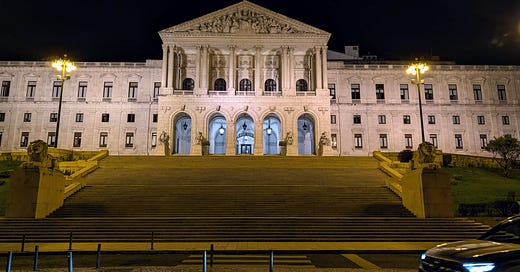MAJOR UPDATE: Immigration laws pass parliament amid harsh criticism
Portuguese news in English on Thursday, July 17, 2025.
A large part of the government’s immigration reforms have passed through parliament with the support of the Democratic Alliance (AD) governing coalition and the far-right Chega, Público reports. All the parties on the left voted against the changes to the foreigners law on Wednesday, and the Liberal Initiative (IL), a right-wing party that had previously supported the reforms, abstained. The Socialist Party (PS), which is the second-largest opposition party just behind Chega, criticised “trampling” of parliamentary procedure. PS MP Pedro Delgado Alves said it was not just that the government had ignored immigrant associations — members of which watched on from the public gallery — but that it didn’t even respect the need for mandatory consultation. The changes include restrictions on applying for family reunion visas, scrapping job seeker visas for most immigrants and limits on what court action can be taken by applicants.
Fierce criticism from opposition parties
Left Bloc leader Mariana Mortágua appealed to President Marcelo Rebelo de Sousa to “never let this law pass”, calling it “repugnant opportunism” that’s “inciting hatred”. Communist Party (PCP) parliamentary leader Paula Santos noted the difference between “poor” immigrants and those with “golden visas”, who are unaffected by the changes. And while IL leader Rui Rocha criticised the former government’s “policy of total discontrol” he said put the country in an “unsustainable situation”, he also called the process “inadmissible”, saying AD "substituted documents and legislative proposals at the 11th hour”. Chega again slammed what it called the “doors wide open” immigration policy of the former government and linked it to “growing insecurity”. António Rodrigues of the governing Social Democratic Party (PSD) defended the rapid passage, arguing immigration had been the most-discussed topic in the country in the past 15 months.
Reforms passed in rapid time
The 16 days it took for the bill to be approved was among the fastest in recent history, Diário de Notícias reports. Along with skipping consultation, the government also ditched normal steps of revising the text of the law and complaints about inaccuracies. Superior Counsel of the Administrative and Fiscal Courts judge Eliana de Almeida Pinto, also criticised the process, saying the one day it was given to provide an opinion on such a sensitive subject did not seem “adequate”.
Questions about constitutionality
Brazilian lawyer Erica Acosta has created a petition calling on Marcelo to ask the Constitutional Court to look into the reform’s constitutionality rather than signing it into law. The petitioners also accuse the government of violating the “principle of equality” by creating "disproportional and unjustified differentiations” between people with different residency permits, particularly relating to family reunion. The president earlier said the “first thing” he would do upon receiving the bill would be to analyse it for doubts about constitutionality. He said there would probably be elements that are not “patently unconstitutional” but would still be better looked at by the court.
Key changes
According to Diário de Notícias, the other key changes include:
The resident must live in Portugal legally for two years before their relatives can apply for family reunion. There are exceptions for the “golden visa” and “highly skilled” professionals. Only children can apply in Portugal itself, with other relatives forced to apply in an embassy or consulate. Couples seeking family reunion visas must prove they lived together outside the country.
The job seeker visa will be limited to only “skilled” work. The list of included professions is yet to be revealed.
Anyone found to have “entered or stayed illegally” in Portugal will have their visa application denied.
Citizens of Community of Portuguese Language Countries (CPLP) member states will no longer be able to apply for residency after arriving without a visa.
There are some more details here from a law firm specialising in immigration.
The changes passed this week — if approved by Marcelo — will only affect the foreigners law and the creation of the National Foreigners and Borders Unit within the PSP police force, the so-called “mini-SEF”. The changes to citizenship waiting times under the nationality law are expected to be voted on in the third week of September.
This is a major update. I’ll have more details about the changes and the reaction to them in the regular Tuesday edition of Portugal Weekly.






Thank you for keeping us informed on this important issues and the underlying contexts and associated impact. Obrigado.